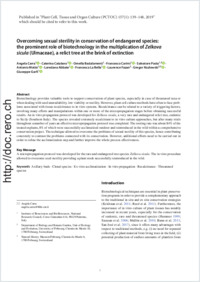Overcoming sexual sterility in conservation of endangered species: the prominent role of biotechnology in the multiplication of Zelkova sicula (Ulmaceae), a relict tree at the brink of extinction
- Carra, Angela Institute of Biosciences and Bio, Resources, National Research Council, Palermo, Italy
- Catalano, Caterina Institute of Biosciences and Bio, Resources, National Research Council, Palermo, Italy
- Badalamenti, Ornella Institute of Biosciences and Bio, Resources, National Research Council, Palermo, Italy
- Carimi, Francesco Institute of Biosciences and Bio, Resources, National Research Council, Palermo, Italy
- Pasta, Salvatore Institute of Biosciences and Bio, Resources, National Research Council, Palermo, Italy - Department of Biology and Botanic Garden, Unit of Ecology and Evolution, University of Fribourg, Switzerland
- Motisi, Antonio Institute of Biosciences and Bio, Resources, National Research Council, Palermo, Italy
- Abbate, Loredana Institute of Biosciences and Bio, Resources, National Research Council, Palermo, Italy
- La Bella, Francesca Institute of Biosciences and Bio, Resources, National Research Council, Palermo, Italy
- Fazan, Laurence Department of Biology and Botanic Garden, Unit of Ecology and Evolution, University of Fribourg, Switzerland
- Kozlowski, Gregor Department of Biology and Botanic Garden, Unit of Ecology and Evolution, University of Fribourg, Switzerland - Natural History Museum Fribourg, Switzerland
- Garfì, Giuseppe Institute of Biosciences and Bio, Resources, National Research Council, Palermo, Italy
-
01.04.2019
Published in:
- Plant Cell, Tissue and Organ Culture (PCTOC). - 2019, vol. 137, no. 1, p. 139–148
English
Biotechnology provides valuable tools to support conservation of plant species, especially in case of threatened taxa or when dealing with seed unavailability, low viability or sterility. However, plant cell culture methods have often to face problems associated with tissue recalcitrance to in vitro systems. Recalcitrance can be related to a variety of triggering factors, involving many efforts and manipulations within one or more of the micropropagation stages before obtaining successful results. An in vitro propagation protocol was developed for Zelkova sicula, a very rare and endangered relict tree, endemic to Sicily (Southern Italy). The species revealed extremely recalcitrant to in vitro culture approaches, but after many trials throughout a number of years an effective micropropagation protocol was completed. The rooting rate was about 84% of the treated explants, 8% of which were successfully acclimatized outdoor and reintroduced in the wild within a comprehensive conservation project. The technique allowed to overcome the problems of sexual sterility of this species, hence contributing concretely to contrast the problems connected with its conservation. However, additional efforts need to be carried out in order to refine the acclimatization step and further improve the whole process effectiveness.
- Faculty
- Faculté des sciences et de médecine
- Department
- Département de Biologie
- Language
-
- English
- Classification
- Biological sciences
- License
- License undefined
- Identifiers
-
- RERO DOC 324632
- DOI 10.1007/s11240-019-01558-x
- Persistent URL
- https://folia.unifr.ch/unifr/documents/307839
Statistics
Document views: 83
File downloads:
- koz_oss.pdf: 264
